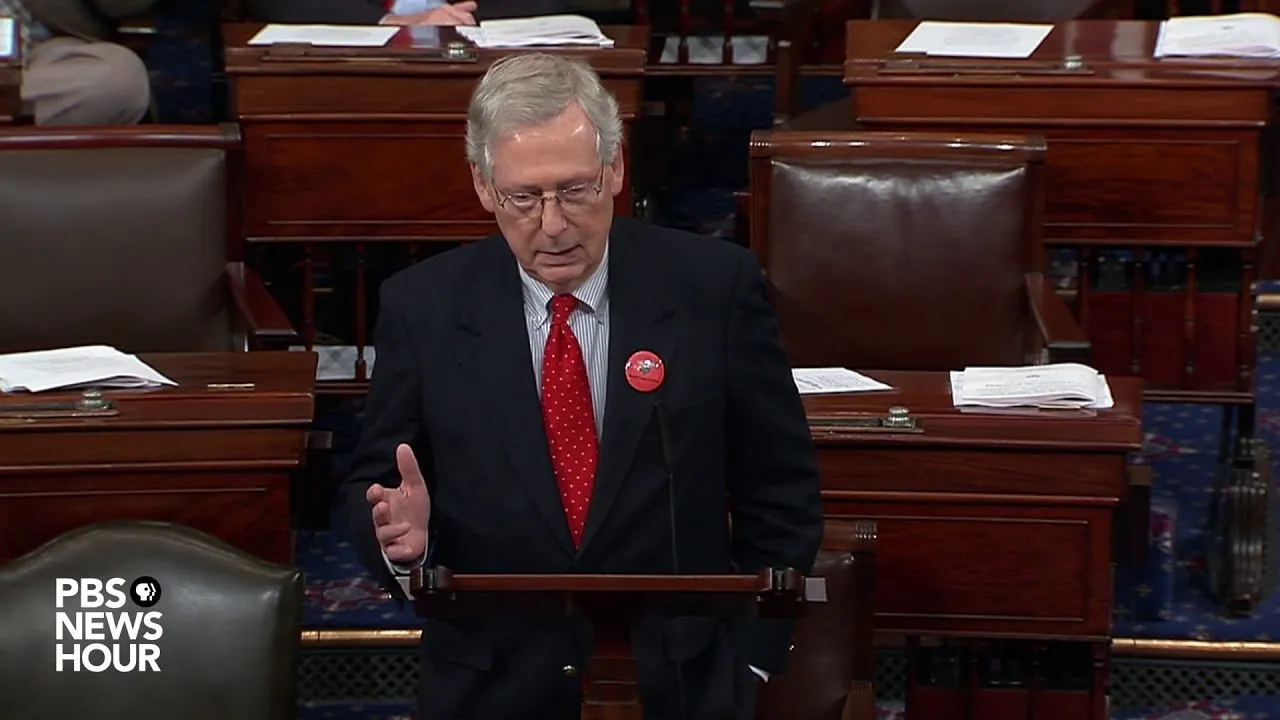Sen. Mitch McConnell has his drawers in a bunch again over a beleaguered outfit he has toyed with over the years as if it was his own, personal play-pretty – the federal judiciary.
The Louisville Republican is miffed that three federal judges appointed by Democrats who announced their intent to retire from the bench reversed course and decided to stay put, thus leaving Mitch’s desire to fill the spots with right-wing zealots unquenched.
The trio arrived at their decision in the wake of the November presidential election, which ensconced Republican Donald J. Trump in the White House yet again, along with a new Senate GOP majority. Apparently, those three took a gander at the 234 federal judges appointed to the bench during the Trump reign of terror that ended in 2021 and decided to perform their patriotic duty by unretiring, much to Mitch’s chagrin.
Those anticipated vacancies, McConnell argued, should “properly belong to the next president.”
“It’s hard to conclude this is anything other than open partisanship,” McConnell fumed in a Senate floor speech last month. “They rolled the dice their Democrat would replace them. Now he won’t. They’re changing the plans to keep a Republican from doing it.”
“This sort of partisan behavior undermines the integrity of the judiciary,” McConnell said. “It exposes bold Democrat blue where there should only be black robes. Never, never before has a circuit judge unretired after a presidential election. It’s literally unprecedented.”
You’ll forgive Mitch for acting as if he had contracted the vapors since he, over the years and more than anyone else, has been the primary source of political games involving the federal judiciary, transforming the court system into a conservative bastion likely to remain that way for at least a generation.
As Senate Republican leader for a historic 18 years, a tenure that just recently drew to a close, Mitch colluded with the right-wing Federalist Society to transform America’s once-proud federal judiciary into a pathetic ghost of itself with appointees to the bench that make Pigmeat Markham look like Oliver Wendell Holmes.
Give Mitch credit. He was keen on manipulating the federal judiciary to his political desires long before most other lawmakers caught on, and has proved very successful in making it into his own image. In an interview with National Public Radio in 2018, McConnell said filling the federal bench with conservatives was his “top priority.”
“There are over 1,200 executive branch appointments that come to us for confirmation, and among the most important — in fact, I would argue, the most important — confirmations we have are lifetime appointments to the judiciary,” McConnell said.
McConnell’s desire to grab the reigns of the federal judiciary goes way back. Upon assuming office in 1985, he snubbed the Judicial Nominating Committee established by Sen. Wendell Ford and the man he defeated, Sen. Walter “Dee” Huddleston, which the pair established to remove partisanship from nominations and appointments to the federal bench.
That committee led to the confirmation of at least one Republican, Judge William O. Bertelsman, of Newport, to a federal district court seat. Bertelsman went on to show the wisdom of creating such a panel by serving with distinction for many years in Covington.
Given the opportunity, McConnell went on to make sure only faithful Republicans were nominated when he had the say so. Among those he tapped were John G. Heyburn II, an advisor who served as McConnell’s special counsel during his tenure as Jefferson County judge-executive; Karen Caldwell, whom he dated back in the 1980s; and David Bunning, the son of the late Sen. Jim Bunning, who served alongside McConnell in the upper chamber. That appointment came before the two lawmakers had a rather bitter falling out.
And let it be fairly noted, Heyburn, Caldwell and Bunning all served the Commonwealth well.
Regardless, it takes a lot of nerve for McConnell to howl about the aborted judicial openings as undermining the integrity of the judiciary given his own, odious history. He made a habit of slowing down and/or blocking nominees offered by Democratic presidents.
The best example came in 2013 when Republicans, led by McConnell, used Senate rules to block the nominations of not one, not two, but three candidates to fill openings on the U.S. Circuit Court of Appeals for the District of Columbia, considered the nation’s second most powerful court behind only the Supreme Court itself, ruling on questions involving White House and federal agency policy.
The three candidates were well qualified for the positions and there were no viable reasons to keep them off the bench, especially since the court was becoming overwhelmed as a result of the unfilled vacancies. Senate Republicans simply wanted to maintain the panel’s conservative tilt and argued the circuit didn’t need any more judges than the eight who were serving.
“Rather, we will be voting on another nominee to a court that doesn’t have enough work to do,’’ McConnell said at the time. “The Senate ought to be spending its time dealing with a real crisis, not a manufactured one.”
Eventually, Senate Democratic Leader Harry Reid, of Nevada, led an effort to change the rules, prohibiting filibusters against all judicial nominees saved for those selected for the Supreme Court, a decision that drew the anticipated yelps from McConnell.
But his coup de grace really came in regard to Supreme Court nominees. When Justice Antonin Scalia died in February 2016, McConnell, then majority leader, refused to consider then-President Barack Obama’s choice to replace him, saying the nomination should be left in the hands of the next president, which in this case turned out to be Trump. The position remained open for about a year and McConnell ultimately engineered the appointment of Justice Neil Gorsuch by implementing his own nuclear option – prohibiting filibusters on nominees to the high court.
Yes, that’s right, the man who howled like a scalded cat when Reid implemented the rule prohibiting the filibuster of nominations to the lower courts imposed his own rule prohibiting filibusters on Supreme Court nominees.
Then, in 2020, when Justice Ruth Bader Ginsberg died, he rushed Trump’s nominee, Justice Amy Coney Barrett, to confirmation before the presidential election.
McConnell has established over the years that he is not to be taken seriously when he moans and groans over the federal judiciary. His only interest is in attaining power and he will do anything, and say anything, no matter how silly, to achieve that aim. He is not, and never has been, a man to be trusted.
--30--
Written by Bill Straub, a member of the KY Journalism Hall of Fame. Cross-posted from the NKY Tribune.








